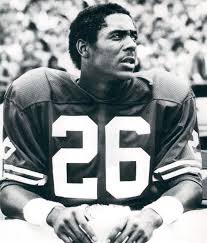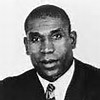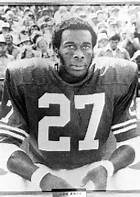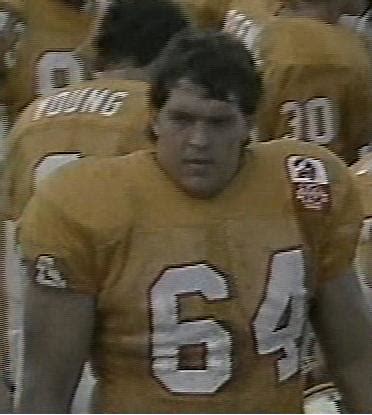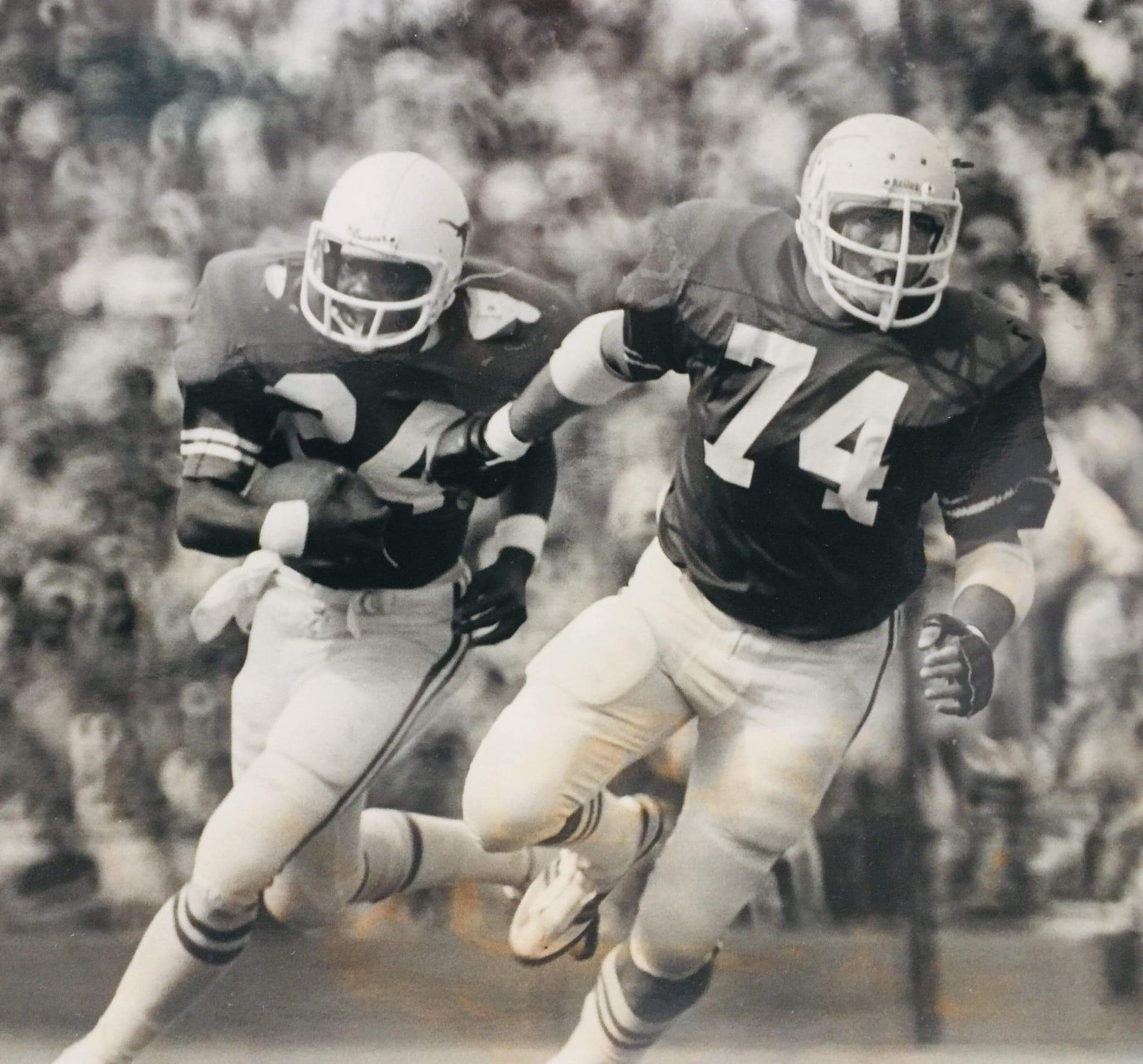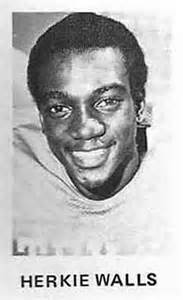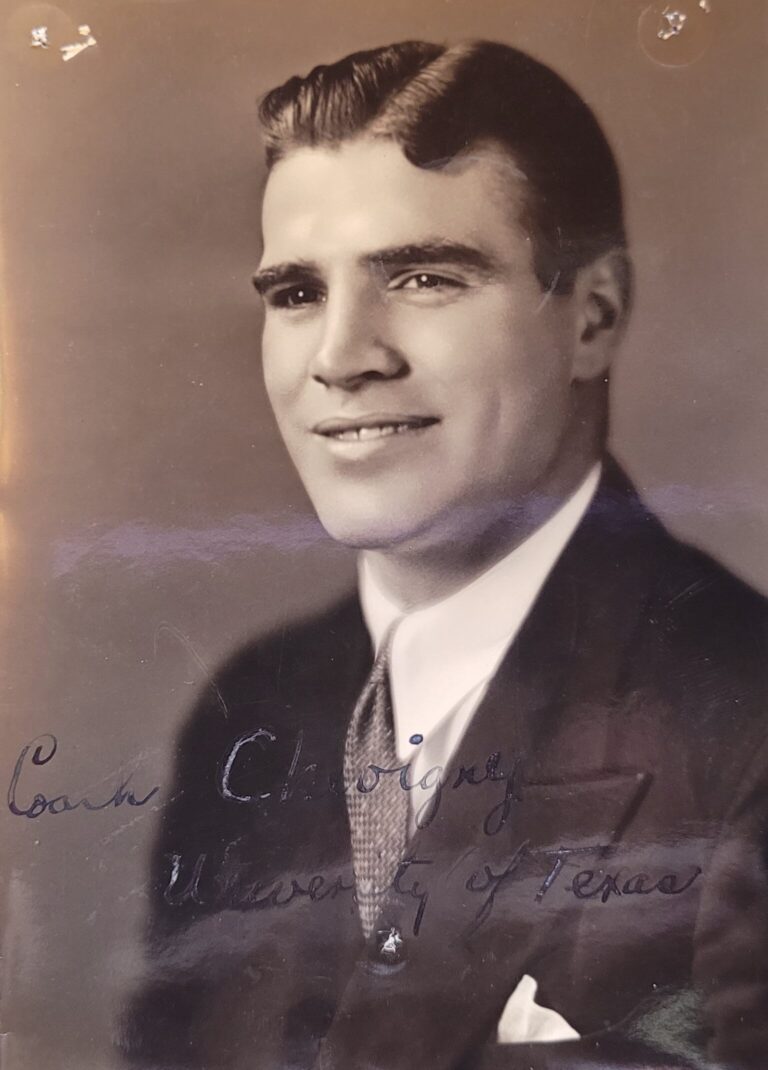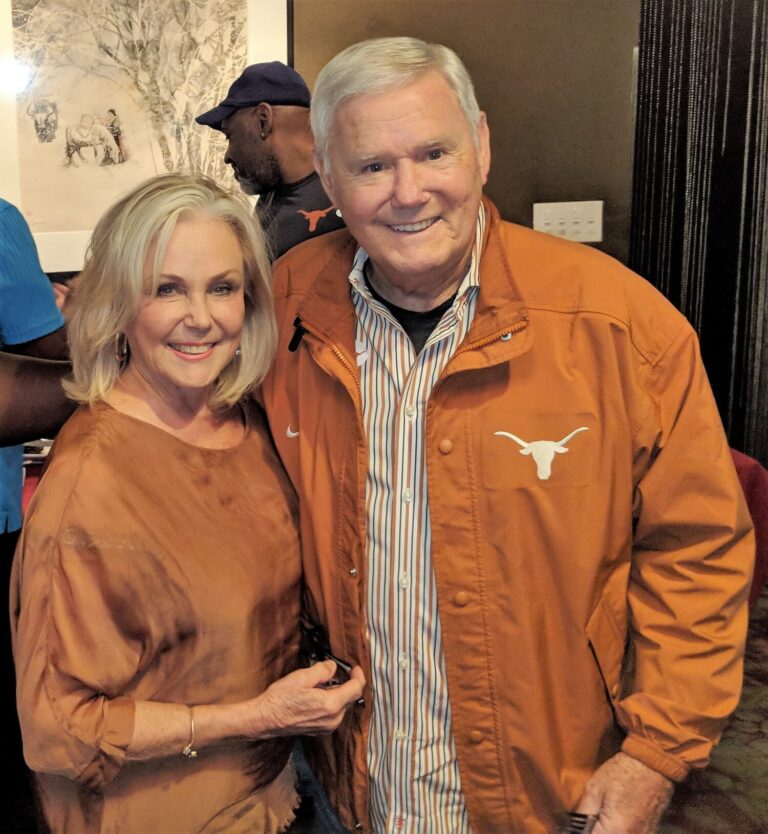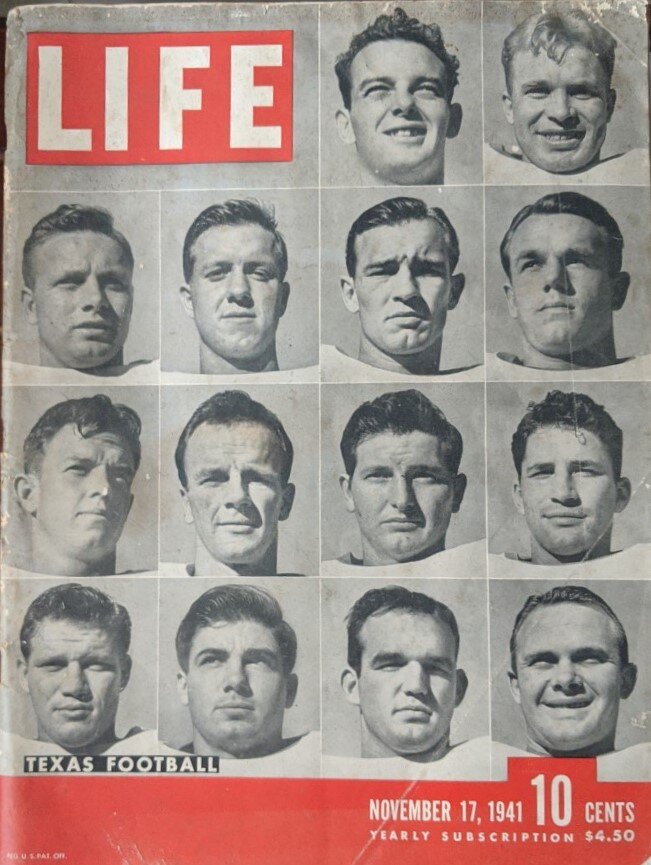1982 Brewer, Walls, Johnson, Jones, Shearin, Clayborn, Brewer
Herkie Walls to Robert Brewer
“Remember Brew Baby the Cream Always Rises to the Top”
The link to Roberts’s oral history podcast with photos and written content is at
https://texas-lsn.squarespace.com/robert-brewer
Robert’s family roots are part of Big 8 and SWC college football history. His father was a quarterback for the Longhorns, and his Uncle played with Darrell Royal at Oklahoma. Robert says, “the Red River rivalry was a huge deal in my family and left an indelible impression on my childhood.” “One-half of the family was always upset after the game.”
In an article in Sports Illustrated in 1982, he says, “All right. I admit it. “When I was little, I rooted for…Oklahoma.” Say it isn’t so, Robert! “Hey, I was an impressionable kid.” One of the many factors that converted a potential Sooner into a Longhorn was the great Longhorn teams from 1968-1972. Robert said that one of his greatest memories was watching the 1969 Cotton Bowl game with his dad when the Longhorns beat Notre Dame for the national championship. From such memories, Longhorns are made.
Charley Brewer (Robert Brewer’s dad ) quarterbacked the Horns to a 21-6 victory over the Aggies in the mid- 1950s.
Robert’s dad is #21 in this photo
Robert Brewer did not receive a Division I scholarship offer out of high school. In a self-deprecating moment in the book Game of My Life by Michael Pearle and Bill Frisbie says ‘with five-Oh time in the forty” was not high on the recruiting list of Division I college coaches. The authors of the book said “Brewer was not the prototypical quarterback. He had no arm strength, he didn’t have great size, and no , he didn’t have blazing speed.”
He realized that his dream of following his father’s footsteps to Texas was problematic. His father led the 1952 Westerners to a state championship and he started for 3 years at Texas. Roberts high school coach felt differently about Robert playing Division I football. Many times unique relationships between high school coaches and University recruiting coordinators are more critical than judging talent by studying films.
Roberts high school Coach Monte Stratton knew Coach Ken Dabbs. One of the keenest recruiting minds in all college football. If not for Ken Dabbs, OU’s Barry Switzer would have signed Earl Campbell. Coach Stratton’s efforts are successful, and Robert meets with Coach Dabbs and Freddie Akers during a UT spring football practice session. After the practice, Coach Akers tells Robert there is no scholarship available, but if he walks on, there would be a roster spot open. Akers concludes the meeting by saying Robert, as he tells all athletes, you must earn the opportunity to play for the Longhorns, and Robert accepts that challenge.
There is still one significant hurdle to overcome before Robert can even think about playing for the Longhorns. He has to qualify academically to attend Texas. UT admissions tell him to attend summer school at UT as a “ provisional student “ and pass 12 core hours with a “B” average or better to attend UT in the Fall. He did not know it at the time, but going to summer school was that destiny-determining moment that forever changed his life. Robert says, “some of the present and former UT players held informal workouts at Memorial stadium each summer evening.” “Because all of the Longhorn quarterbacks were out of town with summer job duties, these guys needed someone to throw routes and workout with them.”
Some impressive Longhorns attended these practices, such as Johnny Lam Jones, Raymond Clayborn, Johnny, and Bobby Johnson, and Mike Hatchett. All treated Robert with respect.
However, impressing players is easier than impressing coaches. Two years of football practice later, Robert is still trying to impress his coaches with his football skills. Mickey Moss, a successful coach, and administrator, says that “goals are good, but without a system of practiced habits in place, goals alone will not lead to success.” Instinctively Robert understands Mickey’s point. He knows the road from walk-on to scholarship athlete is unlikely without practice, preparation, and attitude.
Joe Shearin
Regardless of Robert’s great instinct, he still faces a lot of discouraging times during his first two years on the team. It is during these years of self-doubt that he needs moral support to energize his commitment to remain with the team. As occurs with many young athletes, his world is football, and football determined his self-worth. Robert says, “I was miserable during the first two years.” “I felt I was letting my parents down, especially my dad. ” So he did everything in his power to forget his predicament, but reality was always there. He decides that if he does not play by his third year, he will quit.
In the 8th game of his junior season after the great quarterback Rick McIvor is hurt against Houston, Robert’s preparation, practice and attitude for “his” day pays dividends
Leaving the locker room to start the second half of the Houston game, coach Akers says to Robert, “You’re in.” The speedster Herkie Wall jogs out of the tunnel onto the field looks back at Brewer, and says, “you’re not the 2nd team quarterback anymore, so don’t play like it.” “Remember Brew Baby the Cream Always Rises to the Top.”
Robert Brewer completes the Houston game and starts the remainder of the 1981 season and all of 1982. Robert says for the rest of the 1981 season; Coach Akers had him on a short leash.
As with many players, the media and fans tend to define a player by a single play. Below is part of a Sports Illustrated article about the 1982 Texas/Alabama Cotton Bowl game and a video of the play that defined Robert Brewer.
January 11, 1982 Sports Illustrated
Cotton Bowl
By Pat Putnam
January 11, 1982
At halftime, down 7-0, Texas Coach Fred Akers told his team not to worry. “You hold them in the third quarter,” he said to his defense. Then, turning to his offense, he said, “And you get them in the fourth.”
“I don’t know what it is about Robert,” Akers said earlier in the week. “All he can do is beat you.”
With the Longhorns at the Alabama 30, Brewer threw two incomplete passes. Then, faced with a third-and-10, he called for another pass play that would send Walls deep, with both Little and 6’6″ Tight End Lawrence Sampleton on square-ins.
But as Brewer stepped to the line of scrimmage, he saw Alabama Strong Safety Tommy Wilcox cheating up. “Oh, oh, another blitz,” Ron thought. So he signaled for a time-out. Later, grinning, he said, “I didn’t want to get sacked again. So I figured I’d call time out and put the pressure on the coaches.”
On the sidelines, Akers thanked Brewer for his alertness. Then, after a brief conference with his aides, Akers told his quarterback: “Run Play 1.”
“One,” Brewer thought, surprised. “Golly, that’s a great call. That just might work.”
One—Texas gives simple numbers to all of its plays—is the quarterback draw.
After the play is called, there is concern about blocking assignments in the huddle, so Mike Baabs, Joe Shearin, and Bryan Millard discuss blocking schemes. Robert comes up to the line of scrimmage, and the first thought he has is “don’t trip.”
“We were hoping they’d stay in the blitz,” Akers said. “I was just hoping for a first down.” Not only did Texas catch Alabama in a blitz, but also in man-to-man. With a path as wide as an Interstate, Brewer took off. “I never even saw him until he hit the 10,” said ‘Bama Cornerback Benny Perrin.
Texas won the 1982 Cotton Bowl 14-12. Robert Brewer was the MVP. 30 years before in the same stadium on the same day his dad was MVP, and his team won the high school state championship by the same score.
There is no question that sports build character, and character is a crucial component for a fulfilling life journey. Robert is still stepping up, walking on, and experiencing success by using all the tools of the trade he learned as a Longhorn. Robert closes his story with a big smile and a special thanks to his wonderful teammates. The great Longhorn players and teams of the 1960s. To Coach Akers for giving him the chance of a lifetime. And most of all to his Dad “who made it all available from the very beginning”…..Hook ’em Rb
Robert finished his career with a 13-2 record.
Horns UP and Eyes Up! Billy Dale



